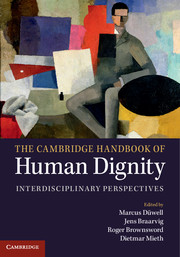Book contents
- Frontmatter
- Contents
- List of contributors
- Foreword
- Why a handbook on human dignity?
- Acknowledgments
- 1 Human dignity from a legal perspective
- 2 Human dignity: concepts, discussions, philosophical perspectives
- Part I Origins of the concept in European history
- 3 Meritocratic and civic dignity in Greco-Roman antiquity
- 4 Human dignity in the Middle Ages (twelfth to fourteenth century)
- 5 Human dignity in late-medieval spiritual and political conflicts
- 6 Human dignity in Renaissance humanism
- 7 The Council of Valladolid (1550–1551): a European disputation about the human dignity of indigenous peoples of the Americas
- 8 Martin Luther's conception of human dignity
- 9 Natural rights versus human dignity: two conflicting traditions
- 10 Rousseau and human dignity
- 11 Human dignity and socialism
- 12 Human dignity in the Jewish tradition
- Part II Beyond the scope of the European tradition
- Part III Systematic conceptualization
- Part IV Legal implementation
- Part V Conflicts and violence
- Part VI Contexts of justice
- Part VII Biology and bioethics
- Appendix 1 Further reading
- Appendix 2 Universal Declaration of Human Rights
- Index
- References
3 - Meritocratic and civic dignity in Greco-Roman antiquity
from Part I - Origins of the concept in European history
Published online by Cambridge University Press: 05 March 2015
- Frontmatter
- Contents
- List of contributors
- Foreword
- Why a handbook on human dignity?
- Acknowledgments
- 1 Human dignity from a legal perspective
- 2 Human dignity: concepts, discussions, philosophical perspectives
- Part I Origins of the concept in European history
- 3 Meritocratic and civic dignity in Greco-Roman antiquity
- 4 Human dignity in the Middle Ages (twelfth to fourteenth century)
- 5 Human dignity in late-medieval spiritual and political conflicts
- 6 Human dignity in Renaissance humanism
- 7 The Council of Valladolid (1550–1551): a European disputation about the human dignity of indigenous peoples of the Americas
- 8 Martin Luther's conception of human dignity
- 9 Natural rights versus human dignity: two conflicting traditions
- 10 Rousseau and human dignity
- 11 Human dignity and socialism
- 12 Human dignity in the Jewish tradition
- Part II Beyond the scope of the European tradition
- Part III Systematic conceptualization
- Part IV Legal implementation
- Part V Conflicts and violence
- Part VI Contexts of justice
- Part VII Biology and bioethics
- Appendix 1 Further reading
- Appendix 2 Universal Declaration of Human Rights
- Index
- References
Summary
Jeremy Waldron (2012) has pointed out conceptual similarities between the Kantian conception of universal human dignity as intrinsic and rights-generating, and an older conception of dignity as high standing. Waldron suggests that human dignity generalizes to all humanity the high standing formerly reserved for a privileged few. This chapter suggests that our understanding of dignity would benefit from attention to an intermediate stage: civic dignity, equal high standing among citizens, as it was practiced in classical Athens. Attending to how civic dignity was protected by coordinated citizen action in Athens reminds us that individuals are secure in their dignity only when others are willing and able to defend it. This chapter distinguishes rights-based human dignity from two predecessor forms in the ancient Greco-Roman world: meritocratic and civic dignity. Ancient conceptions of dignity must be understood in light of three assumptions, common to Greek and Roman ethical thought. First, the fundamental question of ethics is what it is for a life to go well. Second, because humans are social beings, as a practical matter ethics is inseparable from politics. Third, we understand politics better when we attend to history.
Dignity as non-humiliation and non-infantilization
For the Greeks and Romans, living with dignity meant, figuratively and literally, holding one's head up in the company of others and being properly acknowledged by them. This entails having one's claims recognized by others, having their respect, having some measure of control over one's life, having a say in decisions and having responsibility for one's choices. Like liberty, which has been variously defined by contemporary theorists as ‘non-interference’ (Berlin 1969) or ‘non-domination’ (Skinner 1998; Pettit 1997), Greco-Roman conceptions of dignity may best be expressed by what they stand against: dignity can be defined as non-humiliation and non-infantilization. We suffer indignity – humiliation and/or infantilization – when our public presence goes unacknowledged, when we cringe before the powerful, when we are unduly subject to the paternalistic will of others and when we are denied the opportunity to employ our reason and voice in making choices that affect us.
- Type
- Chapter
- Information
- The Cambridge Handbook of Human DignityInterdisciplinary Perspectives, pp. 53 - 63Publisher: Cambridge University PressPrint publication year: 2014
References
- 6
- Cited by

